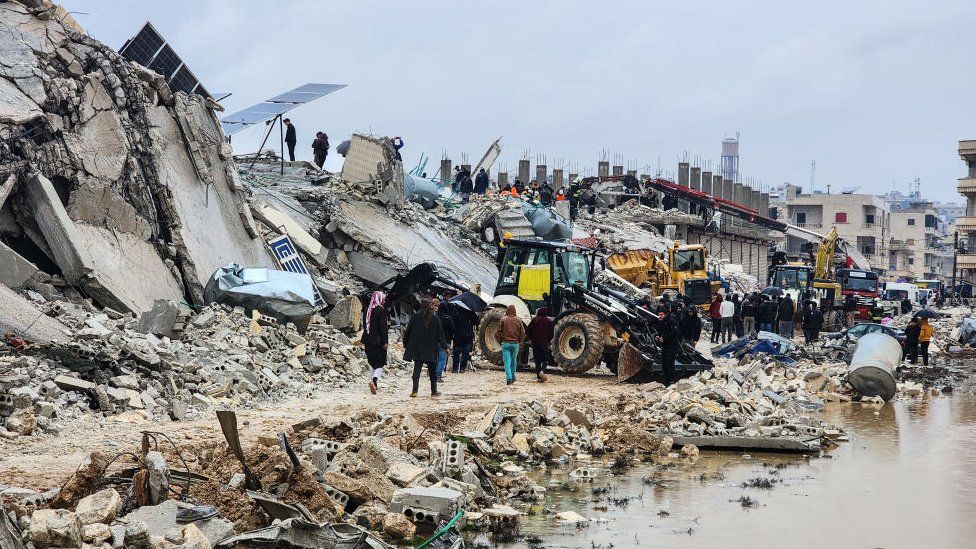

Syria’s war-torn city of Aleppo is one of the places to have borne the brunt of the deadly earthquake, which also devastated parts of southern Turkey.
More than 1,400 people have been reported dead so far in northern Syria following the quake.
Emergency rescue teams said many buildings were damaged or destroyed and that people were trapped under the rubble.
The region is home to millions of refugees displaced by the civil war.
Control of northern Syria is divided between the government, Kurdish-led forces, and other rebel groups. They remain embroiled in conflict.
Even before the earthquake, the situation in much of the region was critical, with freezing weather, crumbling infrastructure, and a cholera outbreak causing misery for many of those who live there.
Much of Aleppo was destroyed in the civil war, which broke out in 2011 when a peaceful uprising against President Bashar al-Assad turned into violence.
While there have been efforts to rebuild the city – Syria’s pre-war commercial hub – there is dilapidated infrastructure, plus destroyed buildings, and power outages are common.
According to separate figures from the Syrian government and the White Helmets rescue group, which operates in rebel-controlled areas, more than 1,400 people have died in the region so far after the earthquake.
A video published on social media, and verified by the BBC, showed a building in Aleppo crashing to the ground as onlookers rushed to safety.
The 7.8 magnitude earthquake struck at 04:17 local time (01:17 GMT) at a depth of 17.9km (11 miles) near the Turkish city of Gaziantep. Twelve hours later, a second quake, which was nearly as large, struck 130km (80 miles) to the north.
Some Aleppo residents told Reuters they have nowhere to go, either because their homes have been destroyed or because they are afraid of further quakes.
A spokesperson for the White Helmets described north-western Syria as a “disaster area” and said families remained trapped under the rubble.
One man in the town of Jandairis told AFP news agency he had lost 12 members of his family in the earthquake. Another said some of his relatives were trapped under the rubble.
“We hear their voices, they’re still alive, but there’s no way to get them out,” he said. “There’s no one to rescue them. There’s no machinery.”
In government-controlled areas, all of the country’s emergency services have been made available, including the army and student volunteers. However, BBC Monitoring’s Hesham Shawish, a Middle East specialist, says this is not enough to deal with the scale of the destruction.
The International Rescue Committee, a charity with more than 1,000 members of staff on the ground in opposition-held areas of Syria, said it was already dealing with the region’s first cholera outbreak in a decade and preparing for approaching snowstorms when the quake hit.
Freezing conditions and torrential rain were hampering rescue efforts.
Mark Kaye, the organization’s Middle East advocacy director, described the situation as a “crisis within a crisis within a crisis” and said vast swathes of the region were beyond contact because of damage to communication networks.
It may also take some time for international aid to arrive. North-western Syria has become one of the hardest places to reach, with only one small crossing on the Turkish border available to transport resources to opposition-held areas.
Some people in remote areas of Syria are said to have been displaced as many as 20 times due to the civil war.
Hundreds of thousands of civilians and fighters have been killed in the conflict and the resulting humanitarian crisis has been compounded in recent years by an unprecedented economic downturn.
Entire neighbourhoods and vital infrastructure, including hospitals, across Syria, were already in ruins as a result of the fighting before the earthquake struck.
The government has called for international assistance – appealing specifically to United Nations member states, the International Committee of the Red Cross, and other humanitarian groups.
However, it has reportedly rejected claims that it has asked for Israel’s aid. The two countries are still technically at war and don’t currently have any diplomatic relations.
Dozens of other nations have promised help, including the United Arab Emirates, Kuwait, and Qatar. The UN said it has teams on the ground that are assessing the situation and providing assistance.
The BBC’s chief international correspondent, Lyse Doucet, has said that Syria’s President, Bashar al-Assad, may be forced to accept help from Western countries and neighbours he has often condemned for backing his enemies.
Russia, which already has a military presence in Syria due to its involvement in the civil war on the government’s side, has also pledged its support.
The Rivers State chapter of the South-South Physically Challenged Indigenes has voiced conditional support for…
Amid growing concerns over a series of defections affecting the Peoples Democratic Party (PDP), party…
President of the Dangote Group, Alhaji Aliko Dangote, has stated that the Dangote Refinery is…
U.S. President Donald Trump indicated on Friday that he may consider reducing tariffs on Chinese…
The city of Umuahia is set to experience an explosion of rhythm, love, and unity…
The full list of nominees for the 2025 BET Awards was unveiled on Thursday, highlighting…